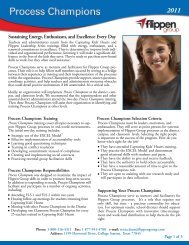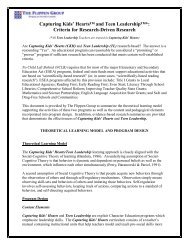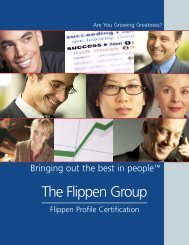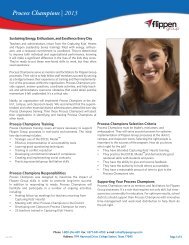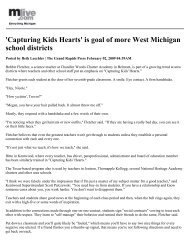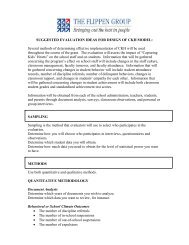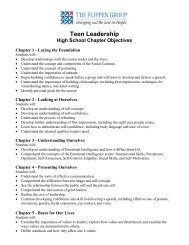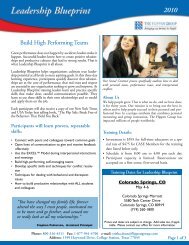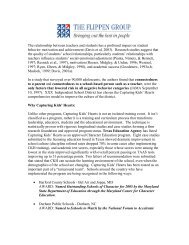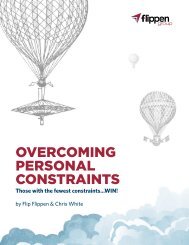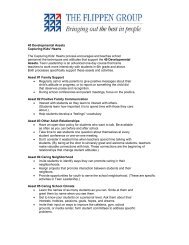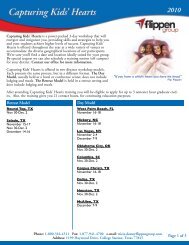Smart & Good High Schools - The Flippen Group
Smart & Good High Schools - The Flippen Group
Smart & Good High Schools - The Flippen Group
- No tags were found...
You also want an ePaper? Increase the reach of your titles
YUMPU automatically turns print PDFs into web optimized ePapers that Google loves.
CHAPTER 6: Commonly Asked Questions about <strong>Smart</strong> & <strong>Good</strong> <strong>High</strong> <strong>Schools</strong>don’t always tell us what we’ve done to help these studentsbecome all they’re capable of being.Our definition of a great educator is to be a “maximizerof potential.” We clearly have that responsibility withstruggling students, but we have it to the same degreewith our most talented students.What about Type A kids who take this “work inprogress” stuff to the extreme, who are never happywith themselves?That’s obviously something we need to be concernedabout and one reason why Outcome 8, becoming a spiritualperson who is crafting a life of noble purpose, isessential. Kids, just like adults, need a larger view of lifethat puts things in perspective.<strong>The</strong>re’s a greater danger of producingstressed-out students in schools thatfocus just on academic achievement.Frankly, we think there’s a much greater danger of producingstressed-out, Type A students in schools that focuson achievement to the exclusion of becoming a sociallyand emotionally skilled person, an ethical thinker, a democraticcitizen, and a spiritual person. <strong>Schools</strong> that don’ttalk about character, about the whole person, are the realbreeding grounds for the “doing school” syndrome thatDenise Pope and others describe.This is why we argue for the integration of strengths ofcharacter such as spiritual person with diligent and capableperformer. We’re arguing for balance. Aristotle said,“Virtue is the mean between excess and deficiency.”When kids do their best to maximize their talent potential,to behave ethically in their relationships, and tobegin to craft a life of noble purpose, they should experiencebalance and fulfillment, not burn-out.What are scheduling issues that a school would need toconsider in order to implement the kinds of thingsyou’re talking about?If we would re-order the world, wemust first ask, “How well are we reorderingour souls?—RUSSELL KIRKScheduling is an important piece of the puzzle. <strong>The</strong> abilityof a school to implement the <strong>Smart</strong> & <strong>Good</strong> <strong>High</strong><strong>Schools</strong> vision will certainly depend on its ability to findthe time to plan, implement, and monitor the practicesthat make this vision come to life. But we also think thevision can be worked into a wide variety of school schedules.One thing many schools have found essential for developingthe PELC is a common planning time. Differentschools have found creative ways to establish that time,which is crucial for the collegial conversation that makesand sustains real change in school culture.What kind of training is required to do the thingsdescribed in the report?Once again, it depends. <strong>The</strong> report features a mix ofpractices with different levels of difficulty. Some, like ahandshake at the door, can be implemented with notraining at all. Other practices, like initiating a democraticstudent government or implementing a quality servicelearning program, would require training. With changessuch as establishing an effective honor code, a schoolwould be wise to look at case studies, use a guidebooksuch as that published by the Council for Spirituality andEthics in Education (www.csee.org), and talk to a schoolthat has developed a code that’s working.<strong>The</strong>re are really two significant areas for training that willhave the broadest possible contribution to realizing thevision of the report. First, training in Re-BAR—Research-Based Action and Reflection. Everything that happens inthe life of the school has the potential to contribute to ordetract from the development of performance characterand moral character. <strong>The</strong>refore, as we explain in ourchapter on the professional ethical learning community,we think it’s critical that educators become reflectivepractitioners who consider the intended outcomes ofeverything they do, collect data on the extent to whichthose outcomes are being achieved, and use that data todetermine what to continue, improve, start, or stop.<strong>Schools</strong> need data in order todetermine what practices to continue,improve, start, or stop.Equally vital is training that helps faculty and staff tobegin working individually and as a community toimprove their own character and build a collegial staffculture—the professional ethical learning community.<strong>The</strong> PELC commits every staff member to two things: (1)217<strong>Smart</strong> & <strong>Good</strong> <strong>High</strong> <strong>Schools</strong>



